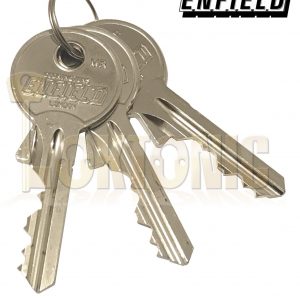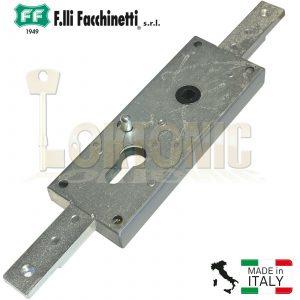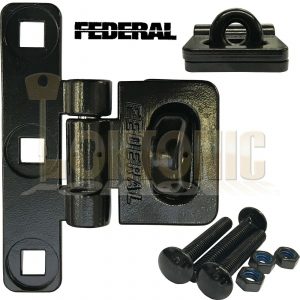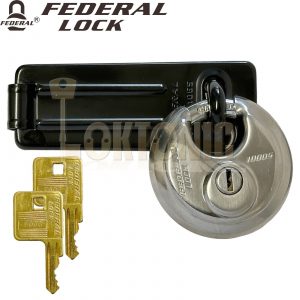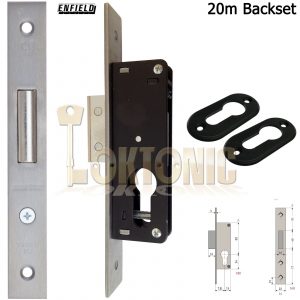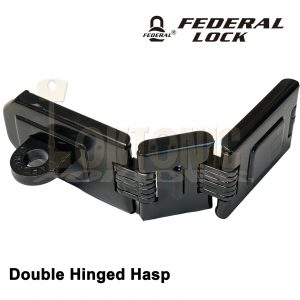What Are Van Deadlocks?
Van deadlocks are additional locking mechanisms installed on a van’s doors. Unlike standard locks, they work independently, requiring a separate key for operation. This extra layer of security provides significant advantages in deterring theft attempts.
Deadlocks use a bolt that physically secures the door against the van’s internal frame. This design makes it much harder for thieves to force the door open. Installed at strategic points, they effectively complement standard locking systems by providing enhanced protection against common break-in methods.
These locks are particularly effective because they don’t rely on the van’s central locking system. If thieves manage to bypass the main locks, the deadlocks remain secured, offering an additional barrier. This feature is crucial when parked in high-risk areas or leaving valuable equipment in the van overnight.
Several types of van deadlocks are available, each catering to different security needs. For example, hook deadlocks latch onto the door frame, providing extra resilience against forceful entry. Slam locks, another variant, lock automatically when the door is closed, which is ideal for drivers who frequently make deliveries and need quick security solutions.
Van deadlocks can be fitted to various door types, including sliding and rear doors. Professional installation ensures they are correctly positioned, maximising their effectiveness while maintaining the van’s usability. Checking compatibility with the specific make and model of the van is essential before installation.
Considering the increasing rate of van thefts, investing in van deadlocks is a practical decision. They provide peace of mind by significantly reducing the risk of unauthorised access to valuable assets. For any van owner prioritising security, van deadlocks are an indispensable upgrade.
Importance of Deadlocks for Van Security
Deadlocks enhance van security by providing an additional layer of protection against theft. They add complexity to the locking system, making it harder for thieves to gain access. Since standard locks alone often fall short of protecting against break-ins, deadlocks are essential.
Many vans carry expensive tools, equipment, and sensitive materials. Deadlocks, through their robust design, ensure these valuable assets remain safeguarded. The bolt mechanism, independent from the van’s central locking, delivers a reliable defence that standard locks can’t match.
Insurance companies often recognise vehicles with deadlocks as less risky. Reduced premiums can result from installing deadlocks, making them a cost-effective security upgrade. Investing in deadlocks not only secures your assets but also potentially saves money.
Deadlocks cater to various needs, with options like hook deadlocks and slamlocks. Hook deadlocks offer enhanced strength for sliding doors, while slam locks lock automatically upon closing, suitable for multi-stop deliveries.
Ensuring vans are equipped with deadlocks is a practical step. For those relying on vans for business, it minimizes the risk of lost tools or materials, ensuring smoother operations. Deadlocks provide peace of mind, knowing your vehicle and its contents are secure.
How Do Van Deadlocks Work?
Van deadlocks enhance security by providing a robust locking mechanism. These locks operate through a bolt that secures the door to the frame, making forced entry much more challenging. Independent of the main lock system, deadlocks remain secure even if the van’s central locking system is compromised.
Installation
Installation involves fitting the deadlock into the chosen door. Professionals typically perform this task to ensure precision. The deadlock is generally installed at a specific height on the door to optimize security. Post-installation, users operate the deadlock using a separate key.
Operation
Deadlocks operate manually. The bolt extends from the lock to secure the door against the van’s frame once the key turns. This manual operation means automatic systems can’t disengage them, adding a significant layer of security.
- Separate Key System: A different key is required for operation.
- Manual Operation: Enhances resistance to tampering.
- Independent Mechanism: Doesn’t rely on the central locking system.
- Bolt Mechanism: A robust bolt secures the door to the frame, increasing difficulty for thieves.
Van deadlocks effectively deter theft. Their independent, manual operation makes them a reliable security feature for van owners aiming to protect their valuable assets.
Types of Van Deadlocks
Van owners have several types of deadlocks to consider, each offering distinct advantages suited to different security needs. Below, we outline the main types and their features.
Traditional Deadlocks
Traditional deadlocks operate independently of the van’s central locking system, adding a robust layer of security. These locks use a high-security key to manually engage and disengage a bolt, making it difficult for thieves to force entry. Traditional deadlocks are versatile, fitting a range of vehicle models and door types. They are particularly effective for reducing theft risk when parked.
Hook Locks
Hook locks feature a unique locking mechanism where a hook-shaped bolt latches onto the body of the van. This design ensures the door remains firmly secured, even under considerable force. Hook locks are especially popular for side and rear doors, providing additional protection for areas typically targeted by thieves. These locks offer enhanced security for valuable cargo, making them ideal for businesses that transport high-value items.
Slam Locks
Slam locks automatically engage when the door is closed, integrating seamlessly into daily operations where quick locking is essential. Ideal for multi-drop delivery services, slam locks require the use of a key to open the door after it has automatically locked. This automatic locking mechanism saves time and ensures that the van is consistently secure, even during brief stops. Slam locks offer a practical solution for high-frequency stops and urban deliveries.
Choosing the Right Deadlock for Your Van
Selecting an appropriate deadlock enhances your van’s security and suits your specific needs. We need to evaluate factors like the type of cargo, door configuration, and usage patterns.
Evaluate Your Security Needs
Assessing security requirements helps determine the type of deadlock needed. Hook deadlocks (ideal for sliding and rear doors where additional force resistance is crucial), slam locks (perfect for multi-drop deliveries needing quick security), and traditional deadlocks (adding an extra layer of manual security) each serve different purposes.
Consider the Van’s Door Configuration
Door placement influences deadlock choice. Hook locks excel on the side and rear doors, where they latch onto the van’s frame, offering increased protection. Traditional deadlocks suit all door types, enhancing overall security, while slam locks are best for side and rear doors due to their automatic engagement.
Understand Installation Requirements
Professional installation ensures deadlocks operate correctly. Specialist installers assess the van’s structure and apply the deadlocks in optimal positions. This avoids damaging the vehicle and ensures maximum security.
Compare Brands and Models
Quality varies across brands. Researching reviews and ratings helps select reliable deadlocks. Companies like Locks 4 Vans and VanGuard offer highly-rated options, known for durability and effectiveness in vehicle security.
Budget and Cost-effectiveness
Balancing security needs with budget constraints is essential. Investing in high-quality deadlocks provides long-term benefits, including potential insurance discounts and reduced risk of theft. Commercial and private van owners should consider this balance.
Check Compatibility with Existing Security Systems
Ensuring compatibility between deadlocks and existing security measures prevents conflicts and enhances protection. Some deadlocks integrate smoothly with alarms and immobilisers, creating a comprehensive security system.
Prioritise User Convenience
Opting for deadlocks that complement daily operations enhances usability. Slam locks, with their automatic locking mechanism, suit frequent access needs. Traditional and hook deadlocks, requiring a separate key, offer added manual security.
By considering these factors, we can choose the most effective deadlock for our van, ensuring optimal security and peace of mind.
Installation and Maintenance Tips
Installation
Installing deadlocks on vans ensures enhanced safety. It’s prudent to have the installation executed by professionals to maintain precision. Opt for technicians experienced in fitting van deadlocks. They possess the necessary tools and expertise to install deadlocks without damaging the vehicle.
During installation, technicians typically:
- Determine the optimal position for the deadlock.
- Drill precise holes to accommodate the lock.
- Secure the lock firmly against the van’s frame.
- Ensure the deadlock functions smoothly with the key.
Professional installation minimises risks of improper fitting, which could compromise security. While DIY kits are available, their use might void warranties or insurance.
Maintenance
Maintaining van deadlocks is crucial for long-term security. Regular checks help identify issues early, ensuring ongoing effectiveness.
Follow these maintenance steps:
- Lubricate the locks every three months using graphite powder to prevent rust and ensure smooth operation.
- Inspect for signs of wear or damage, such as corrosion around the bolt and frame.
- Test the locks monthly to ensure they engage and disengage correctly.
- Clean the deadlocks using a mild soap solution to remove grime and dirt.
If any issues arise, consult a professional to avoid compromising the lock’s integrity. Proper maintenance extends the lifespan of deadlocks, ensuring persistent protection against theft.
Key Takeaways
- Enhanced Security: Deadlocks provide an additional layer of protection compared to standard locks, making it significantly more difficult for thieves to gain access to your van.
- Independent Mechanism: Van deadlocks operate independently of the van’s central locking system, offering a robust defence even if the main locks are compromised.
- Types of Deadlocks: Different deadlocks, such as traditional deadlocks, hook locks, and slam locks, cater to various security needs and van configurations, ensuring versatile protection.
- Professional Installation and Maintenance: Proper installation by professionals and regular maintenance is crucial to ensuring that deadlocks function effectively and provide long-term security.
- Cost-effectiveness: Investing in van deadlocks can lead to lower insurance premiums and reduced risk of theft, making them a cost-effective addition to protecting valuable assets.
Conclusion
Deadlocks offers a robust solution for van owners looking to enhance their vehicle’s security. By investing in these additional locking mechanisms, we can significantly reduce the risk of theft and protect our valuable assets. The peace of mind that comes with knowing our tools and equipment are secure is invaluable.
Choosing the right deadlock involves assessing our specific security needs and considering factors like cargo type and door configuration. Professional installation and regular maintenance ensure that deadlocks remain effective over time. Ultimately, deadlocks are a cost-effective upgrade that provides essential protection and could even lead to lower insurance premiums. Let’s prioritise our van’s security and enjoy the confidence that comes with it.
Frequently Asked Questions
Can van deadlocks be broken into?
Van deadlocks provide a high level of security, requiring a separate key for operation. Even if a thief gains entry through a window, the deadlocks prevent access to the van’s contents, making forced entry extremely difficult.
Are van deadlocks worth it?
Yes, van deadlocks are worth it for enhanced security and peace of mind. They protect valuable assets and may also reduce insurance premiums, making them a cost-effective security upgrade.
How do you stop your van from getting broken into?
Install an alarm system with a loud siren and consider immobilisers to prevent thieves from starting the van, even with the keys. These measures provide an added layer of security.
How to make your van more secure?
Store tools elsewhere at night, mark your property, park strategically, install GPS tracking, and be aware of riskier times. These steps help strengthen overall van security.
Are hook locks better than deadlocks?
Hook locks provide an additional level of security over traditional deadlocks. The hook-shaped bolt prevents the door from being pried apart, offering better protection, especially for high-value cargo.
What are deadlocks for vans?
Van deadlocks are additional locking mechanisms independent of standard locks. They use a bolt to secure the door to the frame, making forced entry significantly harder.
How do van deadlocks work?
Deadlocks utilise a robust bolt mechanism securing the door to the internal frame. They operate manually with a separate key, ensuring that automatic systems cannot disengage them, adding a significant layer of security.
What types of van deadlocks are available?
Traditional deadlocks, hook locks, and slam locks are available. Each type caters to different security needs, with varying operational mechanisms suited to various door types.
Can deadlocks reduce insurance premiums?
Yes, many insurance companies view vans equipped with deadlocks as less risky, potentially leading to reduced premiums. Deadlocks can thus be a cost-effective security enhancement.
Should van deadlocks be professionally installed?
Yes, it is recommended to have deadlocks professionally installed. This ensures precision, avoids potential damage to the vehicle, and guarantees optimal security.
How to maintain van deadlocks?
Regular checks are essential. Lubricate the locks every three months, inspect them for wear or damage, test them monthly, and clean them with a mild soap solution to ensure longevity and effective protection.

